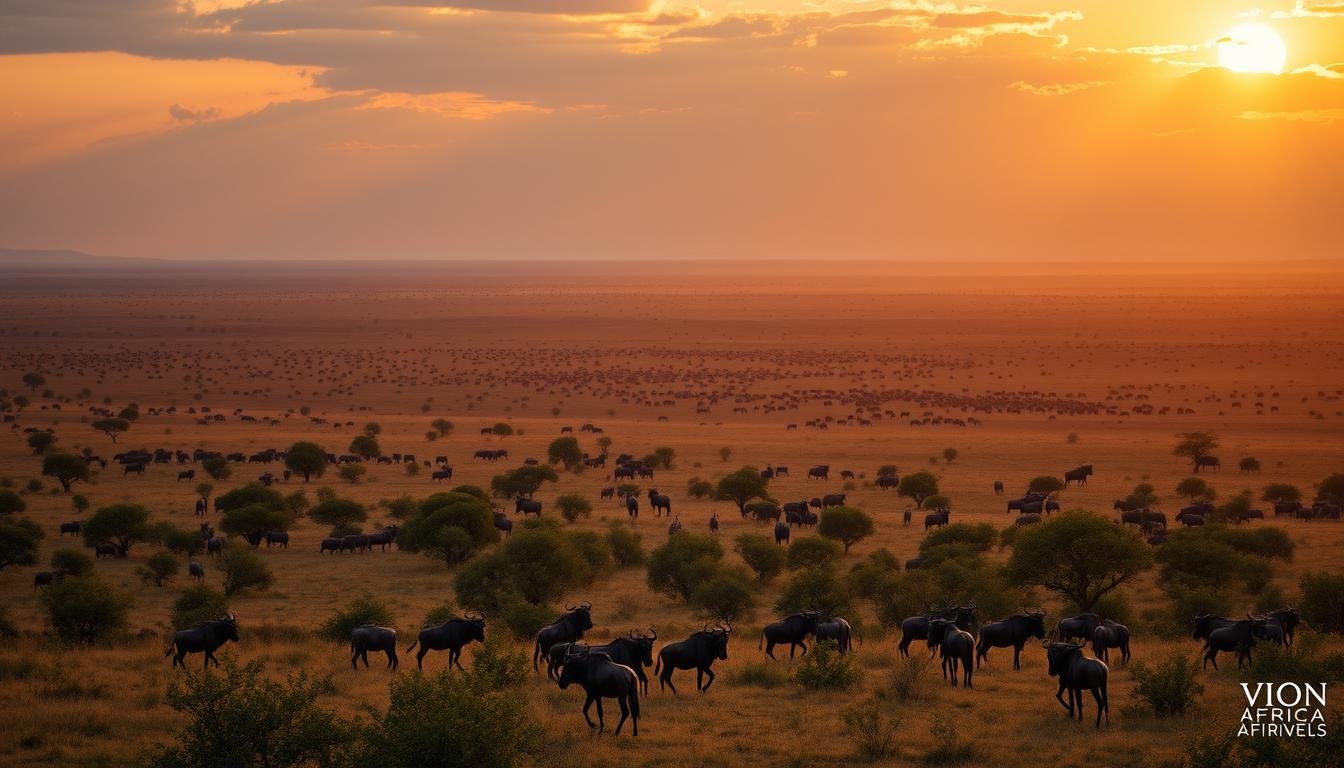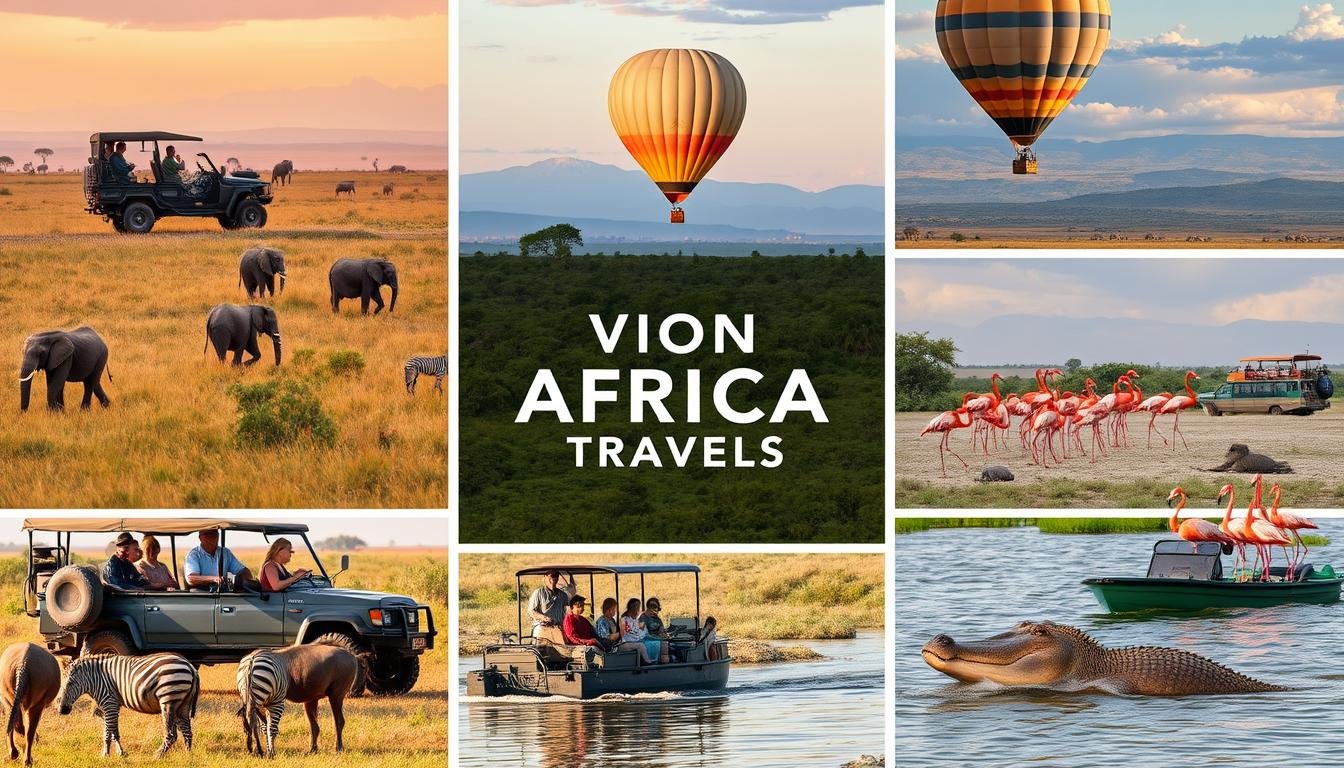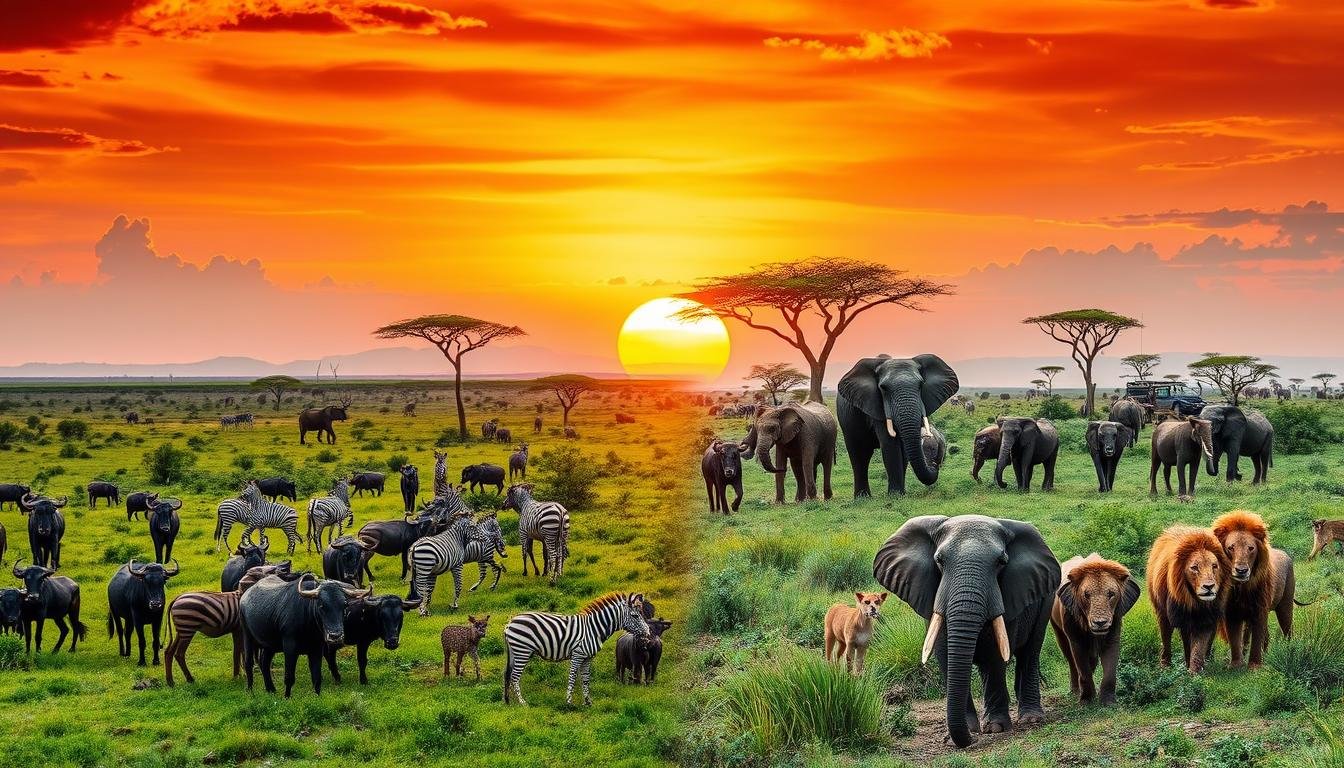Safari in Kenya vs Tanzania: We love nature and have always been drawn to East Africa’s stunning landscapes and wildlife. Kenya and Tanzania are famous for their savannas and vast wilderness. We’ll compare the safari experiences in these countries to help you choose your next African adventure.
Key Takeaways
- Explore the unique features of safaris in Kenya and Tanzania, including their renowned national parks and diverse wildlife.
- Discover the best times to visit each country for optimal wildlife viewing and seasonal highlights.
- Understand the logistics, costs, and accommodation options to plan the perfect safari experience tailored to your preferences.
- Gain insights into the cultural interactions and conservation efforts that make a safari in East Africa truly unforgettable.
- Determine the factors that will help you choose between Kenya and Tanzania for your ultimate wildlife adventure.
Overview of African Safaris
Africa is famous for its amazing wildlife viewing. It’s the top spot for safari lovers. Here, you can see the big five game and many other animals in their homes. Africa’s wild beauty is something everyone should see.
Our Journey Begins: Why Choose Africa
Many people come to Africa for its incredible wildlife viewing. The continent has many national parks and reserves. Here, you can see lions, elephants, leopards, and rhinos up close.
The Allure of the African Wilderness
Africa’s wilderness is not just about the animals. It also has beautiful landscapes and a rich culture. Places like the Serengeti and Drakensberg mountains offer unforgettable experiences.
“The African savanna is a symphony of life, where the primordial dance of predator and prey unfolds before our eyes.” – Jane Goodall
Exploring Africa’s heart, we’ll learn about its challenges and conservation. Join us for a journey that will excite your senses and touch your soul.
The Safari Experience in Kenya
Kenya is a top spot for safaris, with amazing national parks and lots of wildlife. You can see everything from Amboseli’s vast plains to the Maasai Mara’s famous great migration. It’s a trip you won’t forget.
Iconic National Parks: Amboseli and Maasai Mara
Amboseli National Park is at Mount Kilimanjaro’s foot. It’s known for its elephants and beautiful views. You’ll see lions, leopards, and cheetahs here too.
Then there’s the Maasai Mara, famous for the great migration. Millions of wildebeest and zebra migrate here every year.
Diverse Wildlife: What We Can Expect
Kenya is great for seeing wildlife. You’ll see the Big Five – lions, leopards, rhinos, elephants, and buffalo. There are also giraffes and baboons.
Cultural Experiences: Engaging with Local Tribes
Kenya is also rich in culture. We’ll visit Maasai villages. There, we can learn about their traditions, see their dances, and understand their bond with nature.
| National Park | Iconic Species | Unique Experiences |
|---|---|---|
| Amboseli National Park | Elephants, Lions, Leopards | Stunning views of Mount Kilimanjaro |
| Maasai Mara National Reserve | Wildebeest, Zebra, Big Cats | Witnessing the great migration |
Exploring Kenya’s safari world is amazing. You’ll see diverse wildlife, visit iconic parks, and meet local cultures. It’s an adventure you’ll always remember.
The Safari Experience in Tanzania
Let’s dive into the safari adventure in Tanzania. We’re excited to explore the country’s famous wildlife spots. At the center of this journey is the Serengeti National Park, a vast area that has amazed travelers everywhere.
Serengeti National Park: The Crown Jewel
The Serengeti National Park is a true treasure, known for its wide range of wildlife. It’s famous for the great migration, where millions of animals move through the Masai Mara and Serengeti. This park is perfect for seeing amazing animals like lions, leopards, and black rhinos.
Ngorongoro Crater: A Natural Wonder
The Ngorongoro Crater is another must-see in Tanzania. It’s a huge crater formed by a volcano collapse. This place is called the “8th Wonder of the World” and is full of wildlife. You can see elephants, lions, and even black rhinos here.
Unique Ecosystems: From Lakes to Mountains
Tanzania has more than just the Serengeti and Ngorongoro Crater. It has amazing lakes like Lake Manyara and mountains like Mount Kilimanjaro. Each area offers its own wildlife adventures, showing off Tanzania’s natural beauty.
Whether you love the Serengeti’s plains, the Ngorongoro’s crater, or Tanzania’s varied landscapes, this country will impress you. As we keep exploring, we’ll see what makes Tanzania special. It’s a top spot for wildlife lovers and adventurers.
Comparing Wildlife: Kenya vs Tanzania
Exploring Africa’s wonders, we find Kenya and Tanzania offer unique wildlife experiences. From the Big Five to endemic species and birdwatching, each country has its own treasures. These are waiting to be discovered.
Big Five: Where Can We Find Them?
The Big Five – lions, leopards, rhinoceros, elephants, and buffalo – are wildlife viewing’s holy grail. Both Kenya and Tanzania have plenty of these majestic creatures. But, the best places to see them differ.
In Kenya, the Maasai Mara National Reserve is famous for its Big Five. It offers great chances for wildlife viewing and photography. Tanzania’s Serengeti National Park is also known for its diverse Big Five populations. It’s a top spot for any safari lover.
Endemic Species Unique to Each Country
Both Kenya and Tanzania have endemic species found nowhere else. In Kenya, the Grevy’s zebra and hirola antelope are rare sights. Tanzania is home to the elusive blue wildebeest and the stunning Kilimanjaro shrew, found only in the Ngorongoro Crater.
Birdwatching Opportunities: A Review
| Birdwatching in Kenya | Birdwatching in Tanzania |
|---|---|
|
|
Whether you’re interested in the Big Five, endemic species, or birdlife, Kenya and Tanzania have much to offer. As we explore these destinations, we’ll find out what makes them special. This will help you choose the best safari experience for you.
The Best Time for Safaris
Planning the perfect safari in Kenya or Tanzania means timing is key. The best time for your wildlife adventure greatly affects your experience. It also determines which animals you’ll see. Let’s look at the seasonal patterns and weather that matter most for your safari.
Seasonality: Understanding Migration Patterns
The great migration is a stunning natural event in Africa. It’s when millions of wildebeest, zebra, and other animals move across the Serengeti-Maasai Mara. To see this, plan your safari right. The migration is best in the Maasai Mara from July to October and in the Serengeti from December to March.
Weather Considerations: What We Should Expect
The weather conditions in Kenya and Tanzania also play a role. The dry seasons, from June to October in both countries, are best for wildlife watching. Animals gather at water sources during these times. Wet seasons can be tough but might let you see newborn animals.
Choosing the best safari destinations and when to visit them depends on what you want. Knowing the seasons and weather helps you pick the perfect time for an amazing safari.
Types of Safaris Offered
Planning a safari in Kenya and Tanzania offers many choices. You can pick from guided tours for a group experience or self-drive safaris for independence. Each safari type gives a unique view of Africa’s wild beauty.
Guided Tours: Our Group Experience
Guided safari tours are popular. They come with a local guide and luxury accommodations. You’ll see famous national parks and spot the Big Five and more.
Self-Drive Safaris: An Adventurous Option
Self-drive safaris are for the bold. They let you explore Africa’s rough landscapes alone. It’s cheaper than guided tours but needs driving skills and self-reliance.
Walking Safaris: Getting Close to Nature
Walking safaris offer a close-up nature experience. Led by guides, they let you see plants and animals up close. They’re great for photography, showing wildlife in their natural setting.
| Safari Type | Advantages | Disadvantages |
|---|---|---|
| Guided Tours |
|
|
| Self-Drive Safaris |
|
|
| Walking Safaris |
|
|
Kenya and Tanzania offer many safari options. Whether you prefer a guided tour, self-drive, or walking safari, there’s something for everyone. Choose based on your interests and budget for an unforgettable journey into Africa’s wild.
Accommodation Options: Luxurious to Budget
When we go on a safari in Kenya and Tanzania, where we stay is key. We can choose from fancy lodges to budget-friendly spots. There’s something for everyone.
Luxury Lodges: Comfort in the Wild
The luxury tented camps in top safari spots are a dream come true. They mix the wild beauty of Africa with top-notch comfort. Imagine having private verandas, fancy bathrooms, and amazing food.
Midrange and Budget Options: Our Choices
If you’re watching your wallet, there are great budget safaris out there. They offer comfy stays at good prices. This way, we can see the best safari destinations without spending too much.
Camping Experiences: A Night Under the Stars
For the bold, camping in Africa is a must. It’s a chance to really feel the wild around us. Whether it’s a mobile camp or a fixed site, it’s an adventure like no other.
“The true delight of a safari is not just the wildlife, but the intimate connection with the natural world that can be found in every aspect of the experience, from the accommodations to the activities.”
Choosing where to stay really makes our safari special. We can pick from fancy lodges, affordable options, or camping. By thinking about what we want and how much we can spend, we can make a trip that’s just right for us.
Costs of Safari in Kenya vs Tanzania
Planning a safari adventure means looking at the cost. Kenya and Tanzania offer different prices for their safari experiences. It’s key to know the price differences between these two amazing places.
Comparing Price Points for Different Experiences
Safari costs vary from budget-friendly to luxury. In Kenya, a basic safari starts at $150 per person per day. On the other hand, a luxury safari in the Maasai Mara can cost up to $1,000 per person per day. Tanzania offers a budget safari for about $200 per person per day. But, a luxury stay in the Serengeti can go over $500 per person per day.
Hidden Costs: What Should We Watch Out For?
When planning a safari, watch out for hidden costs. These can add up fast. Some examples include:
- Park entrance fees, which can vary a lot
- Costs for optional activities, like hot air balloon rides
- Gratuities for guides, drivers, and camp staff
- Airfare and ground transportation to the safari
- Travel insurance and visa fees
Knowing these hidden costs helps you budget better. This way, you can enjoy your safari in Kenya or Tanzania without stress.
| Expense | Kenya | Tanzania |
|---|---|---|
| Budget Safari (per person per day) | $150 | $200 |
| Luxury Tented Camp (per person per day) | $1,000 | $500 |
| Park Entrance Fees | Varies | Varies |
| Optional Activities | Additional Cost | Additional Cost |
Understanding costs and hidden expenses helps plan your safari budget. This way, you can have a great adventure in Kenya or Tanzania.
Travel Logistics: Getting to Our Safari Destination
Planning a safari in Kenya or Tanzania needs careful thought. You must pick the right airports and choose how to get around. This ensures a smooth and fun trip.
Best Airports for Entry
In Kenya, Jomo Kenyatta International Airport in Nairobi and Moi International Airport in Mombasa are best. They lead to famous parks like Maasai Mara and Amboseli. It’s easy to get to your safari spot from these airports.
In Tanzania, Kilimanjaro International Airport near Arusha and Julius Nyerere International Airport in Dar es Salaam are key. They offer easy access to places like Serengeti National Park and Ngorongoro Crater.
Transportation Options Within Each Country
- Guided safari tours: Many offer packages with transport, stay, and guides.
- Self-drive safaris: For those who like to explore freely, self-drive is great. Car rentals are common in both countries.
- Domestic flights: These flights save time and offer beautiful views, connecting key safari spots.
- Ground transportation: Buses, trains, and private transfers offer a deeper experience of the local culture.
Researching travel details well helps make your safari trip unforgettable. Whether in Kenya or Tanzania, you’ll have a fantastic time.
| Entry Airports | Kenya | Tanzania |
|---|---|---|
| Primary International Airports | Jomo Kenyatta International Airport (Nairobi), Moi International Airport (Mombasa) | Kilimanjaro International Airport (near Arusha), Julius Nyerere International Airport (Dar es Salaam) |
| Domestic Airports | Several regional airports connect to major safari destinations | Several regional airports connect to major safari destinations |
Safety Considerations During Our Safari
As we start our exciting safari in Kenya vs Tanzania, safety is key. Seeing elephants, lions, and other amazing animals is thrilling. But, we must know the risks and take steps to stay safe and have fun.
Understanding Potential Risks
Safaris in Africa, in Kenya or Tanzania, mean exploring where wild animals live. While attacks are rare, knowing the dangers is important. Some risks include:
- Running into dangerous animals like lions, leopards, or buffalo on a game drive
- Getting hurt from animal attacks or rough terrain
- Getting sick from diseases like malaria that are common in some areas
- Dealing with bad weather like heavy rain or storms
Tips for Staying Safe and Enjoying Our Trip
To have a safe and fun wildlife viewing trip, follow these tips:
- Listen to our experienced safari guides
- Keep a safe distance from wild animals, even if they seem calm
- Wear the right clothes and shoes for the terrain
- Make sure we have the right vaccinations and take steps to avoid diseases
- Be alert and aware of our surroundings, especially on walking safaris
- Bring important items like first-aid kits, bug spray, and sunscreen
By knowing the risks and following these safety tips, we can enjoy the safari experience in Kenya vs Tanzania safely. We’ll make sure to have an amazing time seeing incredible wildlife.
Cultural Etiquette: Interacting with Locals
As we start our safari in Kenya and Tanzania, knowing how to interact with locals is key. It’s not just about being polite. It’s also a chance to learn about their lives and make our trip better.
Respectful Engagement with Indigenous Communities
When we visit local villages and meet indigenous tribes, we should be genuinely interested and eager to learn. Here are some tips to make sure we’re respectful and fitting in:
- Dress modestly and avoid revealing clothing, as this is considered disrespectful in many African cultures.
- Seek permission before taking photographs of individuals or entering private spaces within the community.
- Avoid touching or handling sacred objects or artifacts without the express consent of the community members.
- Be mindful of local customs and traditions, and refrain from behavior that may be perceived as disruptive or offensive.
Learning from Our Experiences
Our time with local communities offers a chance to learn and appreciate their culture. By being open and curious, we can have meaningful conversations. This helps us understand the safari in Kenya vs Tanzania better.
We’ll see traditional practices, join in activities, and learn about conservation and sustainability. These experiences will give us a deeper understanding of Africa’s rich cultural diversity.
“The greatest gift we can offer one another is the gift of understanding.” – Nonviolent Communication
Photography Tips for Safaris
Photography on a safari is an exciting challenge. It makes your memories better and lets you share the beauty of Africa with others. Whether you’re experienced or new, these tips will help you get amazing photos on your safari.
Best Times and Locations for Stunning Shots
The best times for photos are during dawn and dusk. The soft, warm light of the sun makes your pictures look amazing. Also, find spots where animals are likely to appear, like watering holes or paths.
Essential Gear for Capturing Wildlife
- A high-quality DSLR or mirrorless camera with interchangeable lenses
- A telephoto lens, preferably a 300mm or 400mm, to capture distant subjects
- Neutral density filters to control exposure in bright light
- A sturdy tripod or monopod for steady, blur-free shots
- Extra batteries and memory cards to ensure you’re always ready to shoot
Good photography equipment is key for amazing safari photos. It lets you capture the beauty of wildlife and the best safari spots. Practice with your gear before you go to get used to it.
“The best camera is the one you have with you.” – Nick Carver
While new gear is tempting, the most important thing is your skill. Anticipate, observe, and react fast to wildlife. Stay open to new techniques and enjoy capturing the incredible sights around you.
Planning Our Safari Itinerary
As we prepare for our African safari, planning the itinerary is key. There are many best safari destinations in Kenya and Tanzania. We’ll look at top spots and activities for an unforgettable safari.
Must-See Locations and Activities
Every safari in Kenya vs Tanzania must see the Masai Mara and Serengeti National Park. These places are full of wildlife, including the Big Five and the wildebeest migration. We’ll also visit the Ngorongoro Crater, known for its diverse ecosystem and rare species.
We’ll also explore the local cultures. Meeting the Maasai will give us a unique view of their traditions and way of life.
Tailoring Our Safari to Fit Our Interests
While the Masai Mara vs Serengeti are highlights, we can customize our trip. Options include hot air balloon rides, guided walks, or photography safaris. This way, we make sure our safari is memorable.
By planning well, we’ll see the best places and enjoy the African wilderness. With so many choices and expert advice, our safari will be an adventure to remember.
Environmental Conservation Efforts
When we go on a safari in Kenya or Tanzania, we help protect these amazing places. Our visits help local efforts to save these ecosystems. It’s key to know how we can support these important projects.
How Our Visits Impact Conservation
Safari tourism is crucial for wildlife conservation in Kenya and Tanzania. The money from visitor fees helps protect endangered animals and parks. By visiting, we help keep the wildlife viewing spots that attract travelers worldwide.
Supporting Local Conservation Initiatives
There are many ways to help local conservation during our safari in Kenya vs Tanzania. This includes:
- Joining volunteer programs for habitat restoration or wildlife monitoring
- Donating to well-known conservation groups in the area
- Talking to local communities about their environmental efforts
- Buying souvenirs from eco-friendly businesses
By getting involved in conservation, we help keep the natural wonders of our safari trips safe for future generations.
“Safaris are not just about the wildlife – they’re about preserving the delicate balance of these ecosystems for the future.”
Conclusion: Choosing Between Kenya and Tanzania
As we wrap up our safari journey, the choice between Kenya and Tanzania is clear. Both countries offer amazing wildlife experiences. But, there are many factors to think about.
Kenya has diverse ecosystems, while Tanzania’s Serengeti is famous for its wildebeest migration. Tanzania’s Ngorongoro Crater is a natural wonder you can’t find anywhere else.
Factors to Consider in Our Decision
When picking between Kenya and Tanzania, consider wildlife diversity, game-viewing opportunities, cultural experiences, and trip costs. Kenya offers a wide range of activities. Tanzania’s Serengeti is known for its wildebeest migration.
The Ngorongoro Crater in Tanzania is a unique natural wonder. It’s a key factor in our decision.
Final Thoughts on Our Safari Adventure
Our safari in Kenya or Tanzania will be unforgettable. Both countries have top-notch wildlife viewing and rich cultural experiences. We should think about our preferences, budget, and what we want to see.
Choosing either destination, we’ll make lasting memories. We’ll gain a deeper love for Africa’s wilderness.



